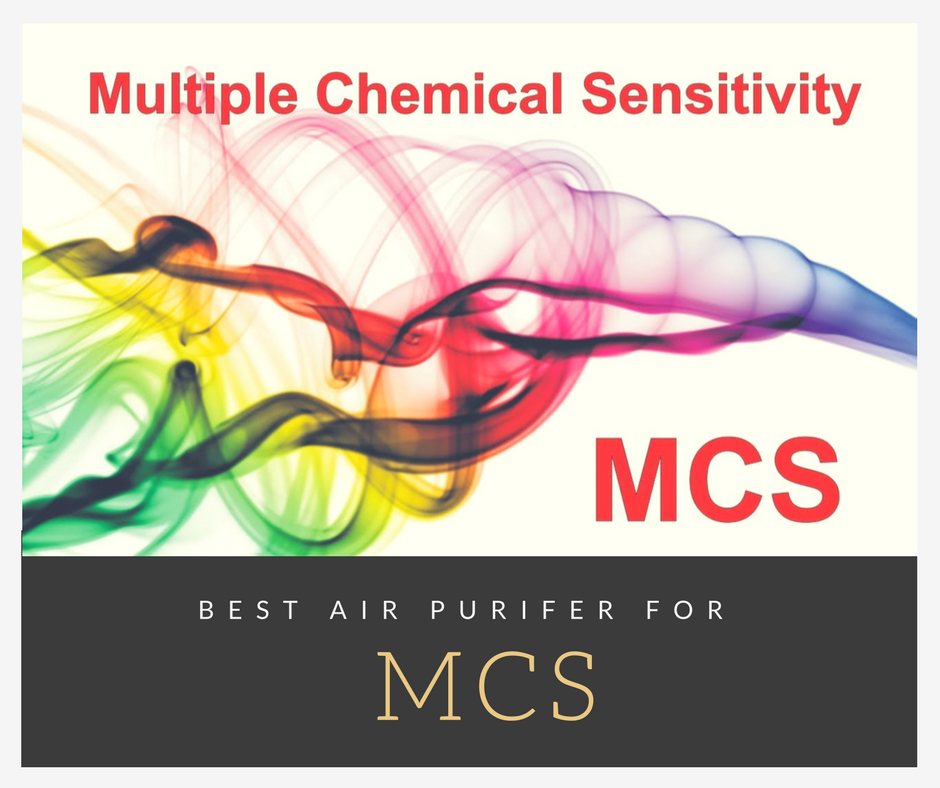It can be very frustrating to navigate the world while always feeling ill if you’ve ever had the crippling symptoms of Multiple Chemical Sensitivity (MCS). Now the question is, can air purifiers help with reducing symptoms of multiple chemical sensitivity? However, before surrendering yourself to a life spent indoors, air purifiers can be an option to take into account. These practical tools have grown in popularity recently due to their capacity to remove airborne allergens and pollutants, which makes them potentially game-changing for people with MCS. Read on to find out if one of these appliances could be the key to a better, more pleasant existence as we investigate whether air purifiers can actually help alleviate the symptoms of MCS.
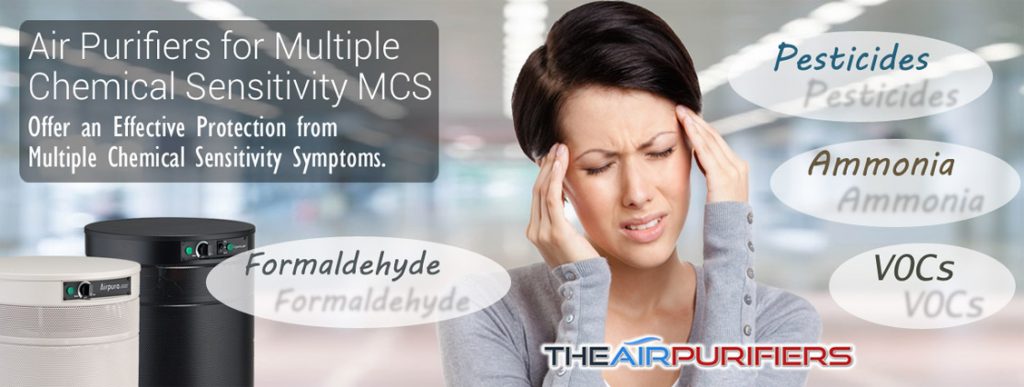
Understanding Multiple Chemical Sensitivity
Definition of Multiple Chemical Sensitivity (MCS)
Multiple Chemical Sensitivity, or MCS, is a disorder in which people have negative consequences after being exposed to different chemicals in the environment. Even at low quantities where they would normally have no effect on others, certain substances can cause increased sensitivity in people with MCS. The symptoms might vary from person to person and can be moderate to severe. Certain building materials, cleaning supplies, insecticides, and scents are a few examples of chemical triggers.
Causes of Multiple Chemical Sensitivity
MCS’s precise cause is still not entirely known. Research, however, points to a potential interaction between genetic, environmental, and immunological variables as the cause. According to some ideas, MCS may develop as a result of earlier chemical exposure, genetic predisposition, and certain medical disorders like allergies or asthma. Long-term exposure to environmental contaminants from both indoor and outdoor sources may potentially contribute to the development of MCS symptoms.
Common Symptoms of Multiple Chemical Sensitivity
Although the signs and symptoms of MCS can differ greatly from person to person, they frequently include breathing difficulties like coughing, wheezing, and shortness of breath. Along with these symptoms, people with MCS may also suffer from skin irritants, headaches, fatigue, nausea, dizziness, and cognitive impairments like memory loss or difficulty focusing. Commonly brought on by chemical trigger exposure, these symptoms may get worse with continued or protracted exposure.
Overview of Air Purifiers
Definition and Function of Air Purifiers
By removing impurities and pollutants from the air, air purifiers are tools created to enhance the quality of indoor air. They function by capturing and neutralizing airborne particles and chemicals using a variety of filters, including HEPA (High-Efficiency Particulate Air) filters, activated carbon filters, and ionizers. Air purifiers come in a variety of sizes and types to accommodate diverse indoor conditions. They can be freestanding devices or integrated into HVAC (Heating, Ventilation, and Air Conditioning) systems.
Types of Air Purifiers
The market offers a variety of air purifier kinds, each with unique filtering systems and characteristics. HEPA air purifiers, activated carbon air purifiers, UV germicidal air purifiers, and ozone generators are a few examples of typical types. While activated carbon air purifiers excel in eliminating odors and volatile organic compounds (VOCs), HEPA air purifiers are good at trapping fine particles and allergens. In order to eliminate germs and viruses, UV germicidal air purifiers use ultraviolet light, while ozone generators emit ozone gas in order to neutralize indoor contaminants.
How Air Purifiers Work
Filters and other technologies are used in combination by air purifiers to capture and get rid of airborne contaminants. For instance, HEPA filters can capture dust, pollen, pet hair, and mold spores that are as small as 0.3 microns. Unpleasant scents and harmful gases can be adsorbted and removed using activated carbon filters. Using ultraviolet rays, UV germicidal lights eliminate bacteria and stop them from reproducing. In order to oxidize and neutralize contaminants, ozone generators produce ozone gas. Air purifiers work to improve the quality of the air we breathe by utilizing these mechanisms.
Effectiveness of Air Purifiers in Reducing Indoor Air Pollution
Numerous studies have shown how well air purifiers work to improve air quality and reduce indoor air pollution. It has been demonstrated that HEPA filters effectively collect a large portion of airborne particles, including those that cause allergies and respiratory problems. Filters made of activated carbon effectively adsorb and eliminate airborne contaminants and smells. Bacteria, viruses, and mold spores can all be effectively neutralized by UV germicidal lights. The precise pollutants present, the unit’s size and kind, as well as the needs and sensitivities of the individual, all affect an air purifier’s overall performance.
Possible Benefits of Air Purifiers for MCS
Removal of Volatile Organic Compounds (VOCs)
For those who have MCS, air purifiers with activated carbon filters are especially advantageous because they are efficient at removing volatile organic compounds (VOCs) from the air. VOCs are frequently present in household products including paints, adhesives, and cleaning products, and they can cause MCS symptoms in those who are sensitive to them. Utilizing an air purifier can drastically reduce the amount of VOCs present in the interior environment, potentially reducing MCS symptoms.
Filtering Out Harmful Particles
Dust, pollen, pet dander, and mold spores can all be effectively removed from the air by using an air purifier with a HEPA filter. When someone has MCS, these particles might make their allergy and respiratory problems worse. Air purifiers can assist produce a cleaner and healthier interior environment by catching and holding these dangerous particles, which lowers the possibility of inducing MCS symptoms.
Reducing Exposure to Chemical Triggers
The capacity of air purifiers to limit exposure to chemical triggers by continuously filtering the air is one of its key benefits for people with MCS. Air purifiers offer a protective barrier that helps reduce the possibility of inducing MCS symptoms by eliminating and neutralizing the chemicals, perfumes, and other triggers frequently found in indoor spaces. This can significantly lessen discomfort and enhance general wellbeing.
Improving Indoor Air Quality
By eliminating pollutants and other impurities from the air, air purifiers are a key component in enhancing indoor air quality. For people with MCS, they contribute to the creation of a cleaner and healthier living environment by removing dangerous particles, chemicals, and odors. Reductions in respiratory problems, allergies, and other MCS symptoms can be brought on by better indoor air quality, enabling people to live more comfortably and take part in daily activities.
Alleviating Respiratory Symptoms
MCS patients frequently experience respiratory symptoms as coughing, wheezing, and shortness of breath. The amount of airborne particles that can cause these symptoms can be greatly decreased with the use of air purifiers with HEPA filters. Air purifiers can reduce respiratory distress and improve lung health in MCS sufferers by supplying cleaner air to breathe. This may result in a discernible improvement in breathing and a general decrease in symptoms associated to the respiratory system.
Enhancing Overall Well-being
The existence of MCS symptoms can significantly affect a person’s general health and quality of life. By lowering the amount of chemical triggers and enhancing the quality of indoor air, air purifiers can contribute to the creation of a safer and more comfortable atmosphere. For those with MCS, air purifiers contribute to improved physical and mental well-being by reducing symptoms and offering a sense of comfort.
Considerations When Choosing an Air Purifier
Identifying Specific MCS Triggers
It’s critical to understand the precise MCS triggers in your area before making an air purifier decision. Fragrances, household goods, herbicides, and specific building materials are examples of common triggers. Knowing the precise chemicals or substances that set off your symptoms will help you choose an air purifier with the right filters and technology to efficiently combat those triggers.
Choosing the Right Type of Air Purifier
Effective treatment of MCS symptoms depends on choosing the proper kind of air purifier. Think about the particular requirements of your environment and the kinds of contaminants you wish to get rid of. While activated carbon air purifiers are the best for eliminating VOCs and odors, HEPA air purifiers are advised for removing particles and allergens. Use of ozone generators and UV germicidal purifiers should be cautiously monitored and should take into account any unique sensitivity.
Understanding Air Purifier Filters
Filters for air purifiers are crucial parts that affect how well the device can capture and remove pollutants. While activated carbon filters excel at adsorbing chemicals and removing odors, HEPA filters are very effective at trapping fine particles. Understanding the filter lifespan and replacement needs is crucial because regular maintenance is required to guarantee the air purifier’s peak performance.
Considering CADR and ACH Ratings
Think about the Clean Air Delivery Rate (CADR) and Air Changes per Hour (ACH) ratings when selecting an air purifier for MCS. According to the size of the space, CADR shows how much clean air the purifier produces. Greater air cleaning efficiency is indicated by a higher CADR. The number of air exchanges per hour (ACH) that a purifier is capable of doing in a given space. To provide a quicker and more thorough air purification process for MCS, greater CADR and ACH values are typically preferred.
Finding the Right Size and Coverage
To guarantee optimum efficiency, it’s critical to choose the proper size and area of coverage for your air purifier. Choose an air purifier that is the right size to manage the area you wish to filter by taking into account its square footage. Undersized or oversized devices may use too much energy or ineffectively clean the air. For each brand of air purifier, manufacturers often offer recommendations on the size of the ideal room.
Operating Costs and Maintenance
It’s crucial to take into account the air purifier’s operational expenses and maintenance needs in addition to the initial purchase price. Filters may need to be replaced on a frequent basis in some systems, which will raise the overall cost. Take into account the air purifier’s energy usage as well as the costs involved. When selecting an air purifier for MCS, consider your spending limit and ongoing maintenance requirements.
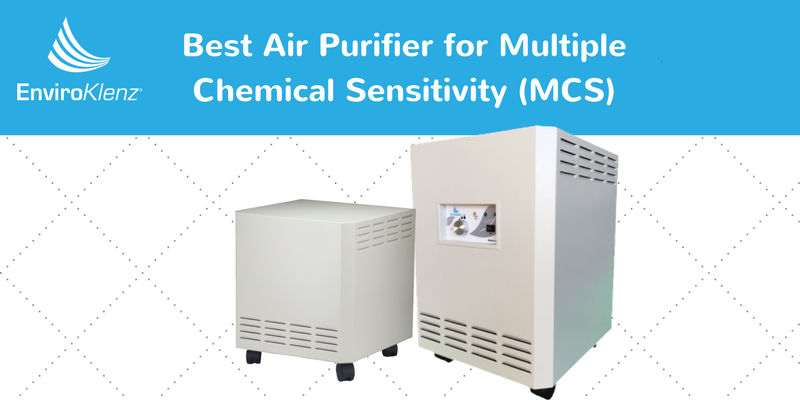
Tips for Using Air Purifiers to Reduce MCS Symptoms
Place the Air Purifier in Strategic Locations
It’s crucial to position an air purifier for MCS in the right places to get the most out of it. Place the air purifier in the living room, bedroom, or home office—areas where you spend the most time. By doing this, you may be sure that the areas that matter to you the most will gain the most from clean air. To promote greater air circulation, think about positioning the air purifier away from major pieces of furniture and walls.
Run the Air Purifier Continuously
It is advised that MCS sufferers leave their air purifier on all the time to keep the air at a consistent degree of cleanliness. Air purifiers are made to work effectively both during the day and at night, guaranteeing that the air quality is always high. The risk of inducing MCS symptoms is decreased by continuously using the air purifier to catch and remove dangerous particles and chemicals from the air.
Properly Maintain and Replace Filters
The best functioning of your air purifier depends on routine maintenance and filter replacement. To maintain the air purifier running efficiently, follow the manufacturer’s directions for cleaning and replacing filters. Lack of filter maintenance can result in decreased effectiveness and weakened air purification. To guarantee that your air purifier continues to offer clean, healthy air, set reminders to check and change filters as needed.
Address Other Indoor Air Quality Factors
Air purifiers are effective instruments for enhancing the quality of the air inside, but they should be used in concert with other strategies to address all forms of air pollution. By using natural cleaning solutions and reducing your usage of perfumes, you can reduce the amount of chemical-based products you use in your house. Open windows when you can to allow for sufficient ventilation, and use exhaust fans in places where moisture and pollution are a problem. To lessen dust and allergens, vacuum your home frequently.
Monitor and Control Humidity Levels
Keeping your interior environment’s humidity levels at their ideal levels will help to lessen MCS symptoms. Mold and mildew can grow more readily in environments with high humidity, which can make respiratory problems worse. Use dehumidifiers to manage excess moisture in damp places, and use a hygrometer to keep track of the humidity levels. To produce a cozy and healthful interior environment, aim for a relative humidity level of 40% to 50%.
Supplement Air Purification with Clean Living Habits
While air purifiers can lessen MCS symptoms, it’s crucial to implement healthy lifestyle practices to maximize the advantages. Smoking should not be done indoors as tobacco smoke contains a number of toxic compounds that can exacerbate MCS symptoms. Use artificial smells, such as those found in perfumes, air fresheners, and scented candles, as little as possible. Instead, choose goods that are naturally scented or free of fragrance. Dust and clean your home frequently to prevent the buildup of allergies and debris.
Expert Opinions on Air Purifiers for MCS
Insights from Medical Professionals
Medical practitioners are aware of the possible advantages of air purifiers for MCS sufferers. They stress the need of recognizing particular triggers and choosing air purifiers that can successfully eliminate those triggers. Medical experts stress the importance of managing MCS holistically, which includes limiting exposure to chemicals, enhancing ventilation, and establishing a safe, chemical-free home environment. Air purifiers can be an effective tool for reducing MCS symptoms, but they are frequently suggested as a component of a more comprehensive management plan that is adapted to each person’s needs.
Experiences of Individuals with MCS
Many MCS sufferers have said that using air purifiers helped to lessen their symptoms. After installing air purifiers, they frequently experience a reduction in additional MCS-related symptoms as well as relief from respiratory problems like coughing and wheezing. The tremendous influence air purifiers can have on enhancing everyday comfort and general well-being for people with MCS is highlighted by personal testimonies.
Research Studies on Air Purifier Efficacy
Studies on the effectiveness of air purifiers for MCS have produced encouraging findings. Numerous studies have demonstrated how successfully particulates, allergens, and VOCs are reduced in interior environments by using air purifiers with HEPA filters and activated carbon filters. Improvements in respiratory symptoms and general air quality have been seen in these investigations. The use of air purifiers may have different effects on different people, so further research is required to develop uniform recommendations and standards.
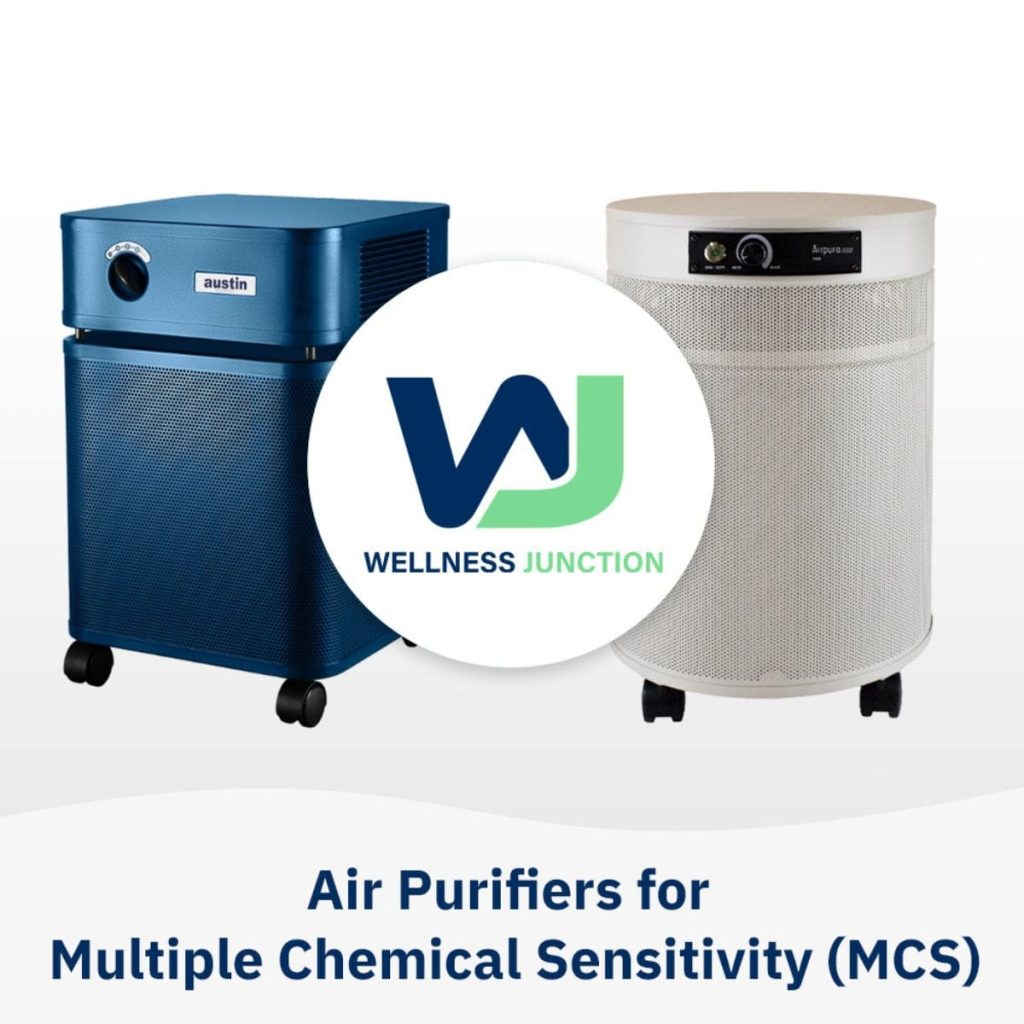
Other MCS Management Strategies
Reducing Exposure to Environmental Triggers
Reducing exposure to environmental triggers is crucial for controlling MCS in addition to using air purifiers. This entails recognizing and staying away from chemical compounds, scents, and other triggers that may result in symptoms. The likelihood of inducing MCS symptoms can be decreased by limiting the use of chemical-based items, choosing fragrance-free substitutes, and establishing a chemical-free home environment.
Creating a Safe and Chemical-Free Home Environment
For those with MCS, establishing a secure and chemical-free home environment is essential. This entails using natural or fragrance-free products, avoiding pesticides and harsh cleaning solutions, and choosing non-toxic building materials. Maintaining a healthier home environment can also be facilitated by installing suitable ventilation systems and ensuring adequate indoor air movement.
Improving Ventilation and Indoor Air Circulation
In order to lower indoor air pollution and improve air quality, there must be adequate ventilation. Effective ways to increase ventilation include opening windows to let in fresh air, using exhaust fans in the kitchen and bathroom, and routinely changing HVAC filters. An uninterrupted flow of fresh air is provided throughout the interior spaces thanks to proper air circulation, which also helps avoid the buildup of contaminants.
Adopting a Balanced and Healthy Lifestyle
Living a balanced and healthy lifestyle can help with MCS symptom management. Regular physical activity, eating healthfully, controlling stress, and getting enough restful sleep are all crucial components in promoting overall wellbeing. The body’s capacity to deal with environmental triggers can be enhanced and the intensity of MCS symptoms can be decreased by taking care of one’s physical and emotional health.
Seeking Support from MCS Communities and Organizations
A feeling of community and helpful resources can be found by reaching out to MCS communities and organizations for support. Living with MCS can be difficult. It can be helpful to connect with people who have the same ailment as you do and who can offer advice and support. Online discussion boards, peer support groups, and regional groups with a focus on MCS can offer a forum for exchanging knowledge and getting professional counsel.
Case Studies on Air Purifier Benefits for MCS
Real-Life Stories of MCS Relief with Air Purifiers
Real-world examples of MCS sufferers demonstrate the beneficial effects that air purifiers can have on symptom alleviation. Many people have talked about how adding air purifiers to their homes has improved their respiratory health, decreased their susceptibility to triggers, and generally made them feel better. These testimonies offer first-hand descriptions of the tremendous improvements in quality of life that air purifiers have made for MCS sufferers.
Before and After Air Purifier Implementation
Case studies have demonstrated significant reductions in symptoms and improvements in indoor air quality following the installation of air purifiers. People with MCS reported lessening their overall sensitivity to environmental triggers as well as a decrease in respiratory symptoms including coughing and dyspnea. The reduction of airborne particles and chemical concentrations has also been shown to significantly improve by objective measurements like pollutant monitoring and air quality testing.
Long-Term Impact of Air Purifiers on MCS Symptoms
Individuals utilizing air purifiers for MCS have showed consistent advantages over time, according to long-term monitoring. According to studies, using an air purifier can reduce the frequency and severity of MCS symptoms, which can enhance a person’s quality of life. People may live more easily in their homes thanks to the ongoing elimination of air pollutants, which also contributes to a healthier atmosphere and lowers the likelihood of MCS symptoms being triggered.
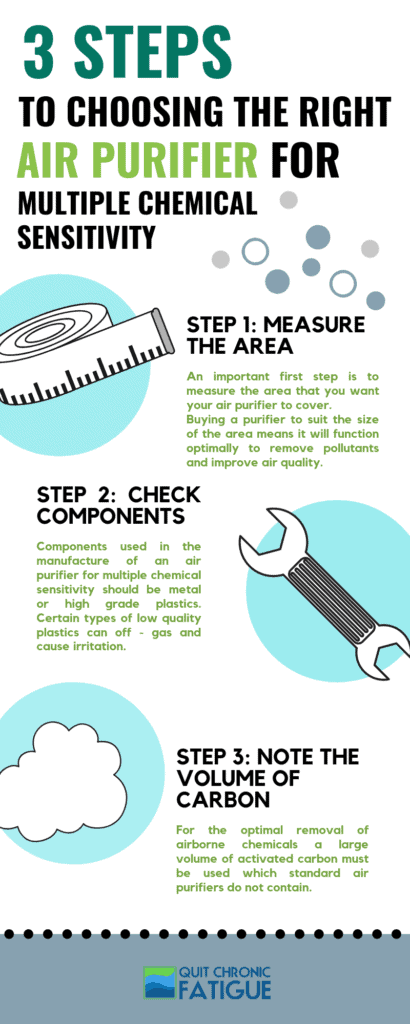
Potential Limitations and Drawbacks of Air Purifiers
Inability to Remove all MCS Triggers
While efficient at lowering indoor air pollution, air purifiers might not be able to fully capture and remove all MCS triggers. Air purifiers use filtration techniques, but some chemical contaminants including volatile organic compounds (VOCs) may be too tiny or resistant to them. In order to effectively treat MCS, it is crucial to combine the use of air purifiers with other methods, such as lowering exposure to triggers and establishing a chemical-free environment at home.
Sensitivity to Noise or Air Purifier Emissions
Some MCS patients could be sensitive to air purifier noise or pollutants. Despite the fact that air purifiers are often made to run silently, some types may emit low-level noise that can affect people with sensitive ears. Additionally, certain air purifiers may release byproducts or an odor that MCS patients may find bothersome. It is essential to pick an air purifier that fits the person’s preferences and sensitivity.
Costs and Considerations for Multiple Units
Multiple air purifiers could be required to get the best air filtration in larger facilities or different regions of a home. It is crucial to take into account the costs of getting and keeping several units. Additionally, some situations may find it difficult to provide the physical space needed for many air purifiers. It is wise to evaluate the unique requirements of each place and balance these aspects appropriately.
Impact of Ambient Air Quality and Outdoor Pollution
Air purifiers are excellent at removing contaminants from interior air, but they have no direct impact on outdoor air pollution or the standard of incoming ambient air. Even with the use of air purifiers, the presence of high amounts of outside pollution might affect interior air quality and perhaps exacerbate MCS symptoms. When managing MCS and including air purifiers into a complete approach, it is necessary to take into account elements like outside pollution levels and air quality.
MCS Variability and Individual Response
Different levels of sensitivity and responsiveness to air purifiers may be experienced by people with MCS. What benefits one person might not necessarily benefit another in the same way. Additionally, elements including the user’s general health, the intensity of their MCS symptoms, and their particular triggers can affect how effective air purifiers are. To find the best air purifier for easing specific MCS symptoms, it is crucial to assess individual responses and run experiments.
Conclusion (Can Air Purifiers Help With Reducing Symptoms Of Multiple Chemical Sensitivity)
Through the removal of pollutants and chemicals from the indoor environment, air purifiers can significantly contribute to the reduction of Multiple Chemical Sensitivity (MCS) symptoms. Air purifiers offer comfort to people with MCS by removing hazardous particles, adsorbing volatile organic compounds (VOCs), and improving the general quality of indoor air. It’s crucial to take certain triggers into account when selecting an air purifier, as well as to pick the appropriate model and comprehend your possibilities for filters. For optimum effectiveness, proper positioning, continued use, and routine maintenance are required. While air purifiers can be an effective tool in treating MCS symptoms, it’s crucial to take a holistic strategy that also involves limiting exposure to triggers, establishing a chemical-free home environment, and seeking assistance from MCS groups and organizations. Individuals with MCS can noticeably reduce their symptoms, improve their general well-being, and enjoy a healthier indoor living environment by including air purifiers into a holistic care strategy.
Recommendations: POMORON Air Purifier

